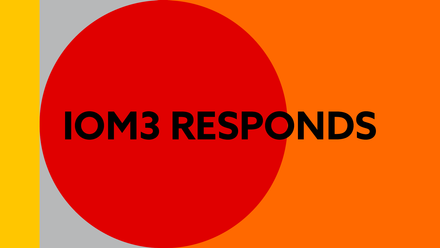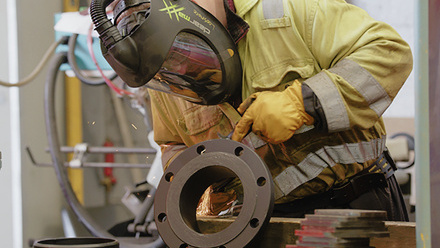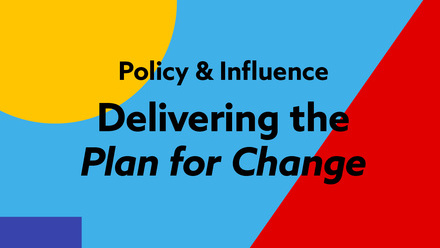Leadership talks
In any industry, successful management often means good communication and meeting your employees’ needs, experienced managers tell us more.
In a report published by Automatic Data Processing in 2018 where 2,000 workers from France, Germany, Italy, Netherlands and the UK responded, the results showed that 40% of UK employees are unhappy with their leaders and 38% worried that managers do not know them well enough. Half of UK employees also believe managers do not understand them nor their true potential.
Clearly, being in charge is no easy task, so how should one approach the role? What makes a good leader? How do we address gender balance in management? How do you best develop a workforce? We ask different leaders for their thoughts and experiences.
The CEO take

The real challenge is... listening to things you do not want to hear.
Colin Brown CEng FIMMM FIMechE is the Institution of Mechanical Engineers (IMechE) Chief Executive he discusses leadership of a professional engineering institution, his leadership style and the qualities of a successful manager.
What does your daily job entail?
My daily job still needs me to remember my science and engineering background. The work of the institution is about engineering, not business, and it is very helpful to know your products. Like most managers, however, I spend my time supporting and guiding a team to achieve a business plan, which in our case is to deliver on our charitable goals.
How did you become the CEO of IMechE?
Like most jobs, it came through my personal network. As most recruitment specialists will say, job offers often come from the confidence of people who know you can deliver, rather than from an isolated application. Certainly as one gets older, if you stay in the same field, you cannot avoid at least one person on the interview panel not either knowing you directly or your work.
Please, describe your leadership style
I like to listen, and then build on people’s strengths rather than focus too much on their weaknesses. If you have people who are good at a certain thing, then it makes sense to me to apply them to that. The key then is to realise their weaknesses and make sure others are around to form a team that works as whole.
Why do you think that style works?
We are a membership organisation and we are lucky to have lots of enthusiastic volunteers. They give their time and effort for free and we need to harness that for the charitable good. I think it is fantastic what we can achieve with a workforce that probably exceeds 5,000 and yet still balance our books.
What is the biggest challenge when managing people? And how do you solve these?
You need to realise that they do not need to be there. It is their choice. Whether volunteer or employee, they have options. You need to set the right standards, create the right atmosphere, and recognise their achievements otherwise they will all leave and go somewhere else where they are appreciated.
What soft skills should a successful leader possess?
It is so important to listen and then do what you can to motivate. All of us need positive feedback. As soon as you start to take anything for granted then you will quickly see that the person delivering it feels they are being taken for granted and stops. The real challenge is, therefore, listening to things you do not want to hear. They cannot be dismissed with negative feedback. They are the reality of what you face and it is your role as a leader to be a problem solver.
What advice would you give someone entering a leadership position?
Do not stop working. There is a huge temptation to think that your role now is just to tell others what to do, as though somehow overnight your judgement got a whole lot better than theirs. You can certainly communicate your standards and set the tone, but don’t be fooled into thinking you are now employed solely as a guru.
How do you think the STEM industry can improve the gender balance in leadership positions?
We need more male role models who espouse gender balance. As men make up 85% or so of the workforce and occupy most of the top positions, it is the men who have it in their power to make the changes.
And why is that balance important?
It is a simple engineering equation. We have a shortage of skills here in the UK and we have data that clearly show diverse teams outperform ones that are all clones.
In your opinion, what makes the best leader or manager and why?
One who makes the best of the situation they are in rather than wishing they were somewhere else. Someone said it was important to stand far enough in front of your colleagues so that they can see where you are going, but not too far that you are out of sight. There are some ultimate leaders who are not in charge of the largest companies. Instead they are doing great work on a local scale.
Colin’s take on leadership:
1. Be yourself. Play to your strengths and aim to copy others who are somewhat like you.
2. Be honest. You must be trusted.
3. Be discreet. You need to know what is going on and people will not tell you if you breach their confidence.

There is no such thing as over-communication
Maria McKavanagh CEO at Verv has overcome ageism in a tough industry and believes good communication is key to leadership.
What does your daily job look like?
Verv specialises in high-speed data acquisition and AI, providing cutting-edge, fault-finding technology to white goods manufacturers to make their appliances smarter and more sustainable. We analyse the energy signature of appliances in high definition in order to detect anomalies in how they are performing and thus detect faults before they occur, alerting the manufacturer and, in turn, the end-user of the issue.
My job is all about communication, from things like the strategy of the business to our employees, to the health of the business to our board members and investors, to the latest developments in our technology to prospective new investors and customers.
On a day-to-day basis, this involves practical things like sales calls and investment pitches, spending time with my colleagues to ensure they have everything they need to deliver on our milestones, and looking forward to ensure we have a clear path to our next stage by taking feedback from the industry and external environment.
Science and engineering industries can be considered ageist, do you, as an inspiring young leader, have any tips for other young people on overcoming this?
Ageism is rife in the industry and I think all start-up leaders will have been negatively impacted by an investor deciding they are not experienced enough by which they actually mean you look too young. This really used to knock my confidence but as the years have gone by, I have outperformed enough experienced people to turn a blind eye to it now. And the reason why I have outperformed them? It is because I am completely aware of the limits in my abilities and I know what I do not know. I then actively seek out an expert and get them to teach me everything they know on the topic. So that is the tip – surround yourself with people who have more experience than you in certain areas and pick their brains in exchange for coffee.
What are the main soft skills that make you a good leader?
I suppose it goes back to the first question – my job is to lead the company and to do that I need to be a good communicator. I try to be as transparent as possible with the team, the board and our investors and set clear expectations. I am also empathetic and want to create an environment where people can be completely themselves at work. If someone has a difficulty in their personal life, I want to know about it so we can work out how we can adapt to their needs.
Maria’s take on leadership:
1. Care about the company and the people who work for it, and constantly strive to improve the performance of both.
2. There is no such thing as over-communication.
3. Be radically candid. If you haven’t heard of Radical Candour by Kim Scott, definitely give it a read.







